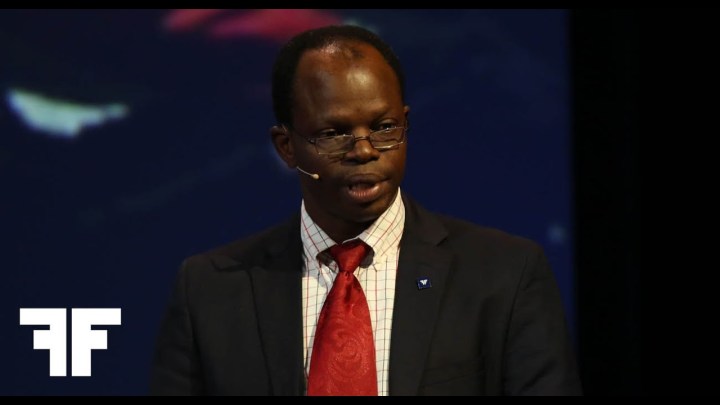ISS TODAY OP-ED
Assassination of human rights lawyer Thulani Maseko pushes Eswatini democracy project into crisis

The murder of the human rights defender and political activist could be a turning point — but which way?
The murder on 21 January of Eswatini’s top human rights lawyer Thulani Maseko — also one of the kingdom’s best political activists — has pushed the country further down the slope towards chaos.
Maseko was clearly assassinated. He was hit by bullets fired through the living room window of his house near Manzini. The killer or killers did not enter the home or steal anything.
But who organised the hit is now the subject of intense speculation. The state is of course a prime suspect. Maseko was a fierce and effective critic of the government and had often legally represented opposition figures falsely prosecuted for their political views. In 2014 he was jailed for two years for penning a stinging critique of Chief Justice Michael Ramodibedi, whom Mswati III later fired for gross misconduct.
Maseko also chaired the Multi-Stakeholder Forum (MSF) — the country’s broad association of political parties and civics. The forum had become the reasonable voice of the opposition even as King Mswati’s government claimed it had no one to talk to about democratic reform.
Mswati publicly stated hours before Maseko’s murder that those causing political trouble in the country should not “cry about mercenaries coming after them.” This appeared to be a response to newspaper claims that the government had hired foreign fighters to eliminate its political enemies.
Shortly after Maseko’s death, Swaziland News reported that a South African mercenary — whose company was training a Swazi security force unit to deal with oppositionists causing violence — had denied involvement in the assassination.
Mswati’s government clearly had a motive to kill Maseko. He and the MSF were a living denial of the king’s claim that the opposition was voiceless and anonymous.
But others have also been suspected of Maseko’s murder. Rumours swirl about divisions and growing tensions within the opposition. Since the rioting and retaliation by the government in June and July 2021, violence between oppositionists and government officials has proliferated. It was this eruption that prompted the Southern African Development Community (SADC) to intervene.
Throughout the turmoil, Maseko remained the opposition’s voice of reason, urging peaceful dialogue. Some say he may have paid with his life for favouring a non-violent approach.
Another theory floated by the Times of Eswatini on 25 January was that his death might have been related to a dispute involving unnamed people attempting to grab family land. However, even the anonymous Maseko family member who spoke to the paper thought his murder was more likely to be political. Others observe that it suits the state to spread rumours deflecting suspicion from itself.
Visit Daily Maverick’s home page for more news, analysis and investigations
Into this simmering cauldron, Russian foreign minister Sergey Lavrov rather obliviously stepped this week. After meeting his counterpart Thuli Dladla, Lavrov said that Moscow was prepared to offer Eswatini training for its security personnel. And this “just days after the brutal murder of a leading human rights lawyer and opposition politician,” as the Moscow Times put it.
Responding to a question on the political crisis in Eswatini, Lavrov said “as a matter of principle, we do not interfere with the political situations of any country.” Shades of Wagner, perhaps, considering the Russian security company’s interventions in countries like Mali and Central African Republic, in support of authoritarian governments and seemingly against Western efforts to promote democracy.
Whoever killed Maseko, his death is not helpful to the cause of Eswatini’s democracy. As MSF chairperson, Maseko successfully articulated the case for a national political dialogue. The MSF was established to do just that after Mswati agreed in November 2021 — under considerable SADC pressure — to launch a national dialogue as a way out of the growing crisis.
That dialogue should have begun almost a year ago, but Mswati appears to have stalled it deliberately. As chair of the SADC security organ South Africa’s President Cyril Ramaphosa was managing the Eswatini file. But by the time he handed over the chair and the file to Namibia’s Hage Geingob last August, nothing had happened. And nothing since — despite Geingob visiting Eswatini to meet Mswati to try to revive the process.
It isn’t clear who will succeed Maseko as MSF chair. On the other hand, given the inherent perversity of politics and circumstances, Maseko’s death might spur SADC into action — like the 2021 violence jolted it into addressing the time bomb long ticking in its midst.
Reacting to Maseko’s killing, the European Union and others reiterated the urgency of the dialogue, arguing that Eswatini’s stagnating politics would likely prompt more violence.
Geingob made the same point in a statement he issued as SADC organ chair on 25 January. He called on Eswatini’s government to investigate Maseko’s killing “swiftly, transparently and comprehensively.” Geingob urged Swazis to “remain calm, exercise due care and consideration whilst the appropriate structures conduct the investigations and bring the matter to completion.”
He said, “SADC reiterates the need for peaceful resolution of the political and security challenges affecting the country. When dialogue fails, people go to war. Therefore, we propose that national and inclusive multi-stakeholder dialogue takes place.”
Perhaps by SADC’s timid standards that could be interpreted as a call on Mswati to finally get going with the national dialogue. But SADC surely needs to be much more demanding than to ‘propose’ something Mswati has already agreed to, if it hopes to prevent the country from sliding further into violence. DM
Peter Fabricius, Consultant, Institute for Security Studies (ISS) Pretoria.
First published by ISS Today.




















 Become an Insider
Become an Insider
Comments - Please login in order to comment.